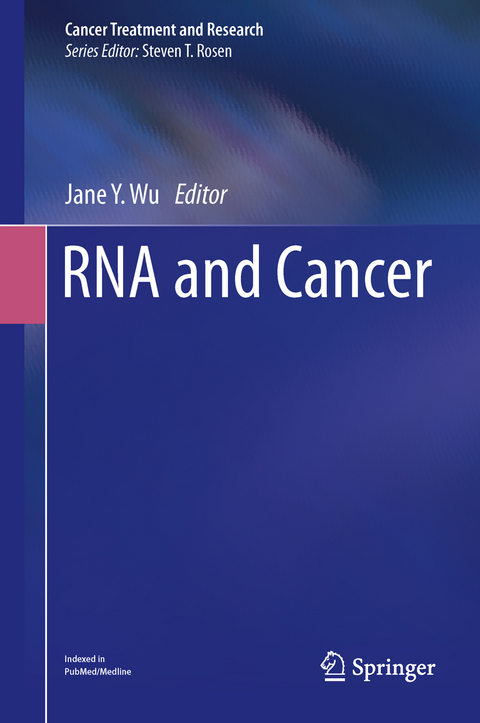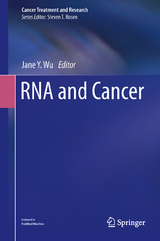RNA and Cancer
Seiten
2013
|
2013
Springer Berlin (Verlag)
978-3-642-31658-6 (ISBN)
Springer Berlin (Verlag)
978-3-642-31658-6 (ISBN)
This review of the latest advances in our understanding of post-transcriptional gene regulation, written by internationally renowned experts, includes a specialized focus on RNA processing and its role in both the development and treatment of cancer.
Accumulating evidence supports the role of defects in post-transcriptional gene regulation in the development of cancer. RNA and Cancer examines the recent advances in our understanding of post-transcriptional gene regulation, especially RNA processing and its role in cancer development and treatment. A particular focus is mRNA splicing, but other topics such as microRNAs, mRNA stability, the perinucleolar compartment, and oligonucleotide therapeutics are also covered in detail. All chapters have been written by internationally renowned experts. The book is intended for all with an interest in gene regulation and cancer biology, and especially for those not directly working on RNA biology, including clinicians and medical students. It is hoped that it will stimulate further innovative research collaborations between RNA biologists and cancer researchers to the benefit of patients. In the last decade, it has become increasingly clear that RNA is not simply a messenger molecule directing protein synthesis. Rather, it has multiple, versatile functional roles in cells, especially in mammalian gene regulation, and thereby influences almost every aspect of cellular life.
This book reviews recent progress in selected areas of RNA processing in which information of particular relevance to cancer development and therapy has been obtained. It opens by examining the coupling between transcription and splicing. Three subsequent chapters describe in detail cancer-associated aberrant RNAs, new methodology for their detection, and the functional impact on expression of important genes, including oncogenes and tumor suppressor genes. Further topics include the role of microRNAs in cancer and the possible involvement of the perinucleolar compartment. The implications for cancer of regulation of mRNA stability by cellular signaling are discussed, and the importance of splicing defects in the regulation of cell death genes is examined. The potential for the development of oligonucleotide therapeutics is then reviewed before the final chapter considers clinical perspectives on the study of RNA defects in cancer.
All chapters have been written by internationally renowned experts. The book is intended for all with an interest in gene regulation and cancer biology, and especially for those not directly working on RNA biology, including clinicians and medical students. It is hoped that it will stimulate further innovative research collaborations between RNA biologists and cancer researchers, leading to improved cancer diagnosis and treatment.
Accumulating evidence supports the role of defects in post-transcriptional gene regulation in the development of cancer. RNA and Cancer examines the recent advances in our understanding of post-transcriptional gene regulation, especially RNA processing and its role in cancer development and treatment. A particular focus is mRNA splicing, but other topics such as microRNAs, mRNA stability, the perinucleolar compartment, and oligonucleotide therapeutics are also covered in detail. All chapters have been written by internationally renowned experts. The book is intended for all with an interest in gene regulation and cancer biology, and especially for those not directly working on RNA biology, including clinicians and medical students. It is hoped that it will stimulate further innovative research collaborations between RNA biologists and cancer researchers to the benefit of patients. In the last decade, it has become increasingly clear that RNA is not simply a messenger molecule directing protein synthesis. Rather, it has multiple, versatile functional roles in cells, especially in mammalian gene regulation, and thereby influences almost every aspect of cellular life.
This book reviews recent progress in selected areas of RNA processing in which information of particular relevance to cancer development and therapy has been obtained. It opens by examining the coupling between transcription and splicing. Three subsequent chapters describe in detail cancer-associated aberrant RNAs, new methodology for their detection, and the functional impact on expression of important genes, including oncogenes and tumor suppressor genes. Further topics include the role of microRNAs in cancer and the possible involvement of the perinucleolar compartment. The implications for cancer of regulation of mRNA stability by cellular signaling are discussed, and the importance of splicing defects in the regulation of cell death genes is examined. The potential for the development of oligonucleotide therapeutics is then reviewed before the final chapter considers clinical perspectives on the study of RNA defects in cancer.
All chapters have been written by internationally renowned experts. The book is intended for all with an interest in gene regulation and cancer biology, and especially for those not directly working on RNA biology, including clinicians and medical students. It is hoped that it will stimulate further innovative research collaborations between RNA biologists and cancer researchers, leading to improved cancer diagnosis and treatment.
Coupling between transcription and alternative splicing.- Detection of alternatively spliced or processed RNAs in cancer using oligonucleotide microarray.- Cancer-associated perturbations in alternative pre-messenger RNA splicing.- Alternative splicing of tumor suppressors and oncogenes.- MicroRNAs in cancer.-The perinucleolar compartment: RNA metabolism and cancer.- Regulation of ARE-mRNA stability by cellular signaling: implications for human cancer.- Alternative pre-mRNA splicing, cell death and cancer.- Oligonucleotide therapeutics in cancer.- Clinical perspective on chemo-resistance and the role of RNA processing.
| Erscheint lt. Verlag | 20.3.2013 |
|---|---|
| Reihe/Serie | Cancer Treatment and Research |
| Zusatzinfo | XIII, 245 p. |
| Verlagsort | Berlin |
| Sprache | englisch |
| Maße | 155 x 235 mm |
| Gewicht | 555 g |
| Themenwelt | Medizin / Pharmazie ► Medizinische Fachgebiete ► Onkologie |
| Medizin / Pharmazie ► Pharmazie | |
| Studium ► 2. Studienabschnitt (Klinik) ► Humangenetik | |
| Naturwissenschaften ► Biologie ► Biochemie | |
| Schlagworte | Alternative Splicing • cell death • Imaging • microarray • Tumor |
| ISBN-10 | 3-642-31658-1 / 3642316581 |
| ISBN-13 | 978-3-642-31658-6 / 9783642316586 |
| Zustand | Neuware |
| Haben Sie eine Frage zum Produkt? |
Mehr entdecken
aus dem Bereich
aus dem Bereich
Eine sehr persönliche Geschichte | Der New York Times-Bestseller
Buch | Softcover (2023)
Ullstein Taschenbuch Verlag
21,99 €
Die revolutionäre Medizin von morgen (Lifespan)
Buch | Softcover (2020)
DuMont Buchverlag
16,00 €




